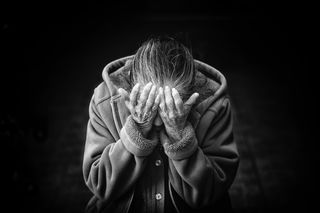Stress
Trump’s Era of Anxiety Is Harming the Nation’s Health
The hyper-stress of the Trump Era will harm our health for a long time to come.
Posted July 31, 2017
While the fate of the U.S. health care system seems – for now – to have survived the threat from Trumpcare, major damage to the nation’s health is already underway. But even if Trumpcare never rises from the dead and comes to pass, severe but hidden risks to the nation’s health are happening right now. The supercharged anxiety of the Trump Era is accelerating the vicious cycle of our current stress epidemic into overdrive.

This vicious cycle is driven by social and biological dynamics that propel each other. Recently Arjumand Siddiqi and I investigated changes in adolescents’ health and development from the mid-1980s to 2010, in 28 wealthy countries. The two major drivers of worsening outcomes were increases in income inequality and decreases in human development investment. And this isn’t true only for adolescent well-being. On average, the more unequal the society and the shoddier its safety net is, the shorter the average life span will be.
Recent research has also begun to unravel how early adversity – even prenatally – “gets under the skin” to cause problems in health and development that then show up throughout life. One key piece of the stress epidemic is that excess stress experienced by expectant mothers, or by infants in roughly the first year of life, can make fundamental changes to how our genes function. Rapidly expanding work on epigenetics – the science of how “genes listen to the environment” – reveals numerous impacts on the brain and basic physiology arising from toxic stress. A major pathway runs through amping up the stress response.
This “stress dysregulation” is disruptive in everyday environments, and eventually leads to numerous health problems. By eroding individuals’ coping abilities and raising the overall stress level for everyone, it’s a major contributor to the stress epidemic. Social media may play up episodes of air rage, road rage, and rage at those viewed as “other” – the teenager wearing a hijab, the black youth walking down the street, the trans student in a public restroom – but evidence shows that these incidents really are on the rise. When leaders model hostility and displays of dominance, many followers are emboldened to act on stress-fueled impulses. Stress begets stress, socially and biologically, with effects that last a lifetime.
Fear and uncertainty are primary drivers of excess stress. When we perceive that we have little or no control, our stress system can go into overdrive. For some groups, anxiety has already begun to skyrocket in the Trump Era. Will my family be able to get the health care we need if we lose our insurance? Will our family’s breadwinner be deported, even without a criminal record? Will a social safety net that we depend on for the basics of food and shelter be shredded?
But this new era of anxiety affects many in addition to those who face such immediate, drastic threats. Families who are doing ok now worry whether their children will have opportunities in their future. As inequality rises, the social ladder gets steeper, the fear of falling increases, and social mobility goes down. Evidence strongly indicates that the stress epidemic is hitting each new generation even harder. And the disorienting effect for everyone from the daily onslaught of attacks on reality – falsehoods, reversals, and contradictions – virtually guarantees a perfect storm for pervasive stress and anxiety.
Can we step back from this tipping point where anxiety, fear, and stress push the stress epidemic into an even faster and deadlier spiral? A good first step is to make use of tried-and-true methods of self-care and caring for others to manage personal stress. But research also identifies the tools that work on the social scale – reducing inequality, investing in human development (especially in the early years), and maintaining civil society as a counterforce to the coarsening of the public arena. But deploying those tools depends on popular will and the political choices we make in the very near future. Before we can begin to push back against the stress epidemic, pushing back against regressive social policy and the follow-on supercharged anxiety of the Trump Era is the first essential step.
References
Keating, D. P. (2017). Born Anxious: The Lifelong Impact of Early Life Adversity – and How to Break the Cycle. New York: St. Martin’s Press. [stmartins.com/bornanxious]
Keating, D. P., Siddiqi, A., & Nguyen, Q. (2013). Social resilience in the neoliberal era: National differences in population health and development. In P. Hall & M. Lamont (Eds.), Social Resilience in the Neo-Liberal Era. New York: Cambridge Univ. Press.


